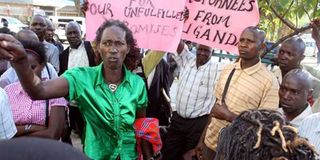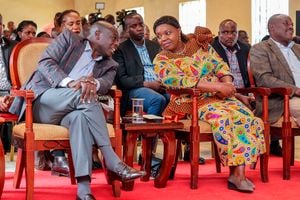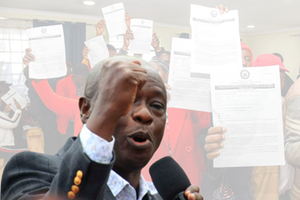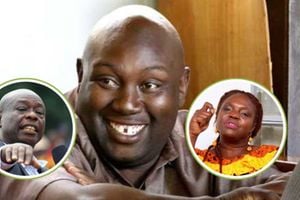PEV victims who dared to dream again plead for peace

Some of displaced Kenyans who crossed over to Uganda during post-election violence. PHOTO | FILE | NATION MEDIA GROUP
What you need to know:
- In Bungoma, a man who fled to Uganda to save his life amid the post-poll chaos has Good Samaritans to thank because they rescued his dream of becoming a lawyer.
- In a blog post on the Ushahidi website on Friday, Mr Manning said the organisation’s hope is that there will be peaceful polls on Tuesday.
- The survivors of the post-poll clashes are also hoping that there will not be a repeat of the 2007-2008 skirmishes.
Eric Kioko’s left hand was chopped off in a flash.
One moment he was raising it to block a machete that was aimed at his head; the next moment the hand was on the ground.
He has his legs to thank for helping him escape from his three tormentors who wanted to snuff out his life somewhere in Mathare slums. But there was no time to pick the hand.
“Had I bent to pick it up and run with it, they might have hit my back,” he told the BBC last week.
A decade after the disputed 2007 General Election that sparked the violence which cost Mr Kioko an entire arm, he has not let the traumatising moment limit his ambitions.
He is now a renowned DJ in Nairobi, going by the name DJ Talanta One Hand.
TALENT
“Even after losing a hand, I said I could not let my talent ebb away; that I must go on with it. I also wanted to be an illustration that someone who has lost any body part should not be lazy: just be strong,” he told the London-based station.
Elsewhere in Bungoma, a man who fled to Uganda to save his life amid the post-poll chaos has Good Samaritans to thank because they rescued his dream of becoming a lawyer, which has been deferred following the violence.
Mr Peter Marango Mwibanda was living in Nairobi during prior to the violence. He had sat his KCSE exams and was planning to join the University of Nairobi to study law.
But fate had other ideas. He lost some of his family members during the violence and he fled to Uganda. Life wasn’t easy for him.
“Life became so hard but I embraced the situation and moved on. My dream of joining the University of Nairobi had been shattered,” he recalls.
LAWYER
He later found well-wishers while in Uganda, who helped him study law at Kampala University. He is now a practising lawyer in Bungoma and a member of Sikhule&Mwibanda Advocates.
It is during his stay in Uganda when he wrote The Quest for Peaceful Co-Existence in Kenya, a book in which he says the government of the day lacks sympathy towards the deplorable conditions internally displaced persons live in.
But that is not the only flower that grew from the post-poll melee of 10 years ago.
It is at the height of the violence that Kenyan technology company Ushahidi was formed and this year, it is rolling out what it calls its biggest ever deployment to monitor the election.
Ushahidi started as a project by renowned blogger Ory Okolloh Mwangi, who was forced to move to Johannesburg as the violence raged.
USHAHIDI
Forbes reported in 2009 that Ms Mwangi published her email address online for people to send updates on what was happening, and that torrents of information flowed in.
What followed was a collaboration by various people online across the globe and Ushahidi was born.
Today, it is a full-fledged platform employing more than 25 people and which has been used to let people report about their surroundings for different crises in 160 countries.
Its latest available annual report, which is for the year 2015, shows that it raised $2,430,398 (252.7 million) that year through grants and contributions.
This year, Ushahidi has collaborated with Facebook to include the social media giant’s Messenger platform as one of the ways — besides SMS and Twitter — through which Kenyans can report anything noteworthy around them.
Under its Uchaguzi initiative where it has partnered with other organisations, Ushahidi is running a 24-hour situation room at iHub along Nairobi’s Lenana Road whose operations started on Saturday. They will run until Wednesday.
SEND VIDEOS
Mr Nat Manning, who was recently appointed Ushahidi’s interim executive director, told the Nation that by using Facebook Messenger, Kenyans can send photos and even videos of notable happenings around them.
“Facebook is a huge platform here and it works really well with photos and videos,” he said in a phone interview.
If they [Kenyans] see anything, they need to report it in so that it can be recorded.”
In a blog post on the Ushahidi website on Friday, Mr Manning said the organisation’s hope is that there will be peaceful polls on Tuesday.
“But if there is any irregularities, the 700+ Uchaguzi observers, general public and trained volunteers will be able to report electoral incidents,” he wrote.
The survivors of the post-poll clashes are also hoping that there will not be a repeat of the 2007-2008 skirmishes.
SPARK VIOLENCE
“Let politicians never spark violence in the elections ahead. Because since 2007, those who were affected have not got justice up to now.
That means we fight so they can get a job and we remain suffering,” Mr Kioko said. He was attacked after he threw stones at a group that had waylaid a woman.
“That time, women could even be raped. I took a stone and threw it at them, to see if they could retreat. What I didn’t know is that three of them had seen me and they attacked me from behind. When they reached me, they were targeting my head,” he recalled.
Mr Mwibanda, on his part, opines in his book that the 2007/08 violence was largely based on ideological differences among politicians and widespread election malpractices.
“It was an expensive exercise that resulted to loss of lives and property and rendering thousands of Kenyans homeless. We have overplayed our differences, poverty and diseases have no ethnic boundary,” he states.
The lawyer, who is also a peer counsellor, says the government should mould youth to be people who cannot be used by politicians for selfish gains.





